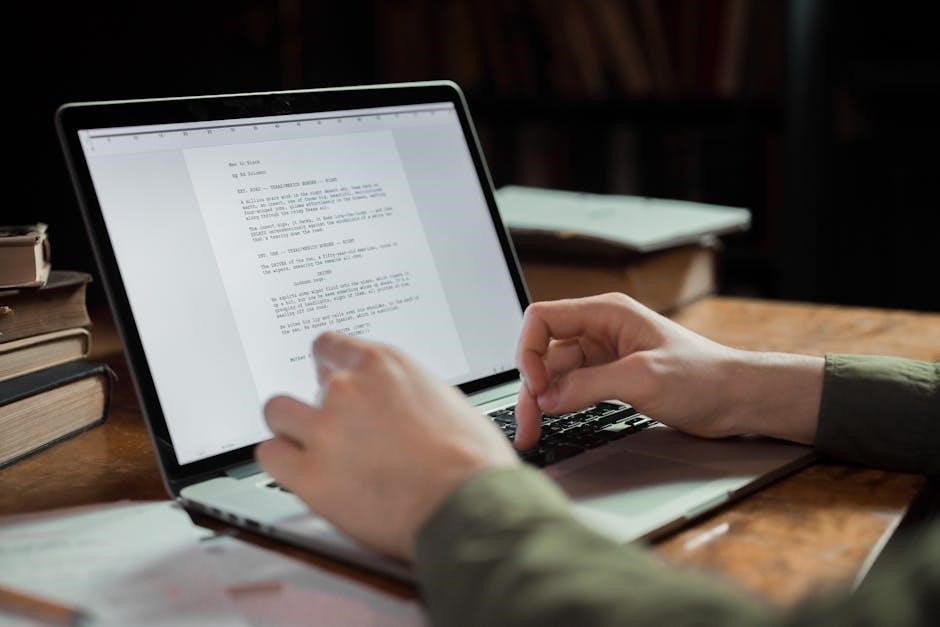Arguing About Literature 3rd Edition offers a comprehensive guide to understanding literary analysis and composing arguments‚ featuring real-world examples and new chapters on digital literacy․
Overview of the Book
Arguing About Literature 3rd Edition is a dual-purpose textbook that combines a guide to literary analysis with a curated anthology of stories‚ poems‚ essays‚ and plays․ It emphasizes critical thinking and argumentative writing skills‚ offering real-world examples to illustrate key concepts․ The book includes new chapters on evaluating internet resources and visual arguments in the post-truth era‚ making it highly relevant for modern students․ With a focus on inquiry-based learning‚ it organizes works thematically to encourage deeper exploration of complex topics․ This edition also features a compact design‚ balancing theory with practice‚ and is widely available as a free PDF for educational use‚ making it accessible to students and educators worldwide․
Why the 3rd Edition is Relevant
Arguing About Literature 3rd Edition remains highly relevant due to its updated content addressing contemporary issues in education and literature․ The inclusion of new chapters on evaluating internet resources and visual arguments in the post-truth era equips students with essential skills to navigate the digital age․ These chapters emphasize critical thinking and media literacy‚ crucial in today’s information-rich environment․ The book’s accessibility as a free PDF enhances its reach‚ making it a valuable resource for students and educators alike․ By focusing on diverse perspectives and modern examples‚ the 3rd Edition ensures it stays pertinent and engaging for today’s learners․ Its relevance is further underscored by its ability to adapt to evolving educational needs‚ ensuring it remains a key tool in literary education․

Key Features of the 3rd Edition
The 3rd Edition includes a new chapter on evaluating internet resources and visual arguments in the post-truth era‚ along with updated content and supplementary materials for enhanced learning․
New Chapter on Evaluating Internet Resources
The 3rd Edition introduces a new chapter focused on evaluating internet resources‚ equipping students with essential skills to critically assess online information․ This section emphasizes the importance of digital literacy‚ particularly in identifying credible sources and recognizing biases․ It provides practical strategies for students to navigate the vast amount of online content effectively․ The chapter also addresses the challenges of misinformation and fake news‚ offering guidance on how to verify sources and evaluate arguments presented online․ By incorporating real-world examples‚ this chapter prepares students to engage with digital content thoughtfully and responsibly‚ making it a vital addition to the updated edition․
Inclusion of Visual Arguments in the Post-Truth Era

The 3rd Edition incorporates a dedicated focus on visual arguments‚ recognizing their growing influence in contemporary debates․ This section explores how images‚ videos‚ and other visual media shape public opinion and convey arguments․ Students learn to critically analyze visual content‚ identifying persuasive techniques and potential biases․ The chapter also addresses the challenges of misinformation in the post-truth era‚ offering strategies to evaluate the credibility of visual sources․ By engaging with real-world examples‚ readers gain the skills to construct and deconstruct visual arguments effectively․ This addition underscores the importance of visual literacy in today’s digital landscape‚ making it a valuable resource for understanding modern communication․

Where to Find the Free PDF
Arguing About Literature 3rd Edition is available for free download on platforms like Project Gutenberg and other eBook websites․ Visit https://getmediafree․blogspot․com for easy access․
Project Gutenberg and Other Free eBook Platforms

Project Gutenberg is a leading platform offering free access to Arguing About Literature 3rd Edition in PDF format․ This platform provides a vast library of eBooks‚ including educational materials‚ making it an ideal resource for students and scholars․ Additionally‚ many other free eBook platforms offer downloads of this edition‚ catering to diverse learning needs․ These platforms ensure that users can access the text easily for academic purposes․ The availability of PDF downloads makes it convenient for readers to study offline․ With its focus on literature and argumentation‚ this edition remains a valuable resource for those seeking to enhance their critical thinking and writing skills․

Download Options for Offline Reading

Arguing About Literature 3rd Edition is available for download in PDF format‚ enabling offline reading and convenient access to its comprehensive content․ Users can download the PDF directly from various educational platforms‚ ensuring uninterrupted study․ The eBook is compatible with multiple devices‚ making it easy to access on laptops‚ tablets‚ or smartphones․ Additionally‚ supplementary materials in formats like Mobi and EPUB are available for diverse reader preferences․ These download options cater to students and scholars seeking to engage with the text offline‚ promoting deeper analysis and argumentation skills․ The ability to save and organize the PDF offline enhances the learning experience‚ allowing users to highlight and annotate key sections effortlessly․ This flexibility makes the 3rd Edition a practical resource for academic and personal use․
Guide to Reading and Writing Arguments
Arguing About Literature 3rd Edition serves as a guide to developing analytical and argumentative skills‚ offering practical strategies for interpreting texts and constructing compelling arguments effectively․
Understanding Literary Analysis
Arguing About Literature 3rd Edition equips students with the tools to critically analyze literary works‚ fostering a deeper understanding of themes‚ characters‚ and narrative structures․ By exploring real-world arguments and diverse perspectives‚ the text bridges the gap between academic theory and practical application․ The guide emphasizes the importance of evidence-based reasoning‚ encouraging readers to support their interpretations with textual examples․ Additionally‚ the inclusion of visual arguments and digital literacy chapters prepares students to navigate the complexities of modern communication․ Through its comprehensive approach‚ the book helps learners develop the analytical and argumentative skills essential for engaging with literature in a meaningful way‚ both in and out of the classroom․
Real-World Applications of Literary Arguments
Arguing About Literature 3rd Edition highlights the practical relevance of literary arguments in everyday life‚ demonstrating how critical thinking and analytical skills can be applied to real-world issues․ The text explores contemporary debates‚ such as free speech and social media‚ to illustrate how literary analysis informs broader societal discussions․ By engaging with diverse perspectives‚ readers learn to articulate their own arguments effectively․ The book also emphasizes the value of evidence-based reasoning in professional fields like law‚ politics‚ and media․ This edition further addresses the impact of digital communication‚ equipping students to navigate the challenges of modern discourse with confidence and clarity‚ both academically and professionally․

Anthology of Stories‚ Poems‚ Plays‚ and Essays
The anthology presents a diverse collection of stories‚ poems‚ plays‚ and essays‚ organized thematically to spark inquiry and discussion‚ enriching critical thinking and analytical skills․
Thematic Collections for Inquiry-Based Learning
The anthology features thematic collections of stories‚ poems‚ plays‚ and essays‚ designed to inspire inquiry-based learning․ These collections explore universal themes such as identity‚ morality‚ and technology‚ encouraging readers to engage with diverse perspectives․ By grouping works around central questions‚ the text fosters critical thinking and debate․ Students can analyze how different genres and authors approach similar issues‚ developing their ability to construct nuanced arguments․ The thematic organization also allows for interdisciplinary connections‚ making the material relevant to broader academic and real-world contexts․ This approach not only enhances literary understanding but also prepares learners to articulate their own views effectively․
Additional Resources and Tools

Supplementary materials include PDF-style eBooks‚ Microsoft Word‚ and PowerPoint resources‚ catering to diverse interests like literature‚ technology‚ and science for enhanced learning experiences․
PDF-Style eBooks and Supplementary Materials
The 3rd Edition offers PDF-style eBooks and supplementary materials for enhanced learning․ These resources are available in multiple formats‚ including PDF‚ Microsoft Word‚ and PowerPoint‚ catering to diverse interests such as literature‚ technology‚ and science․
Platforms like Project Gutenberg provide free access to these materials‚ making them easily accessible for educational purposes․ Additionally‚ a brief guide to arguing about literature is available as a PDF-style eBook‚ ensuring flexibility for readers․
These tools support a wide range of learning needs‚ offering comprehensive support for students and educators alike․ The inclusion of supplementary materials enriches the learning experience‚ providing additional perspectives and resources for deeper understanding․